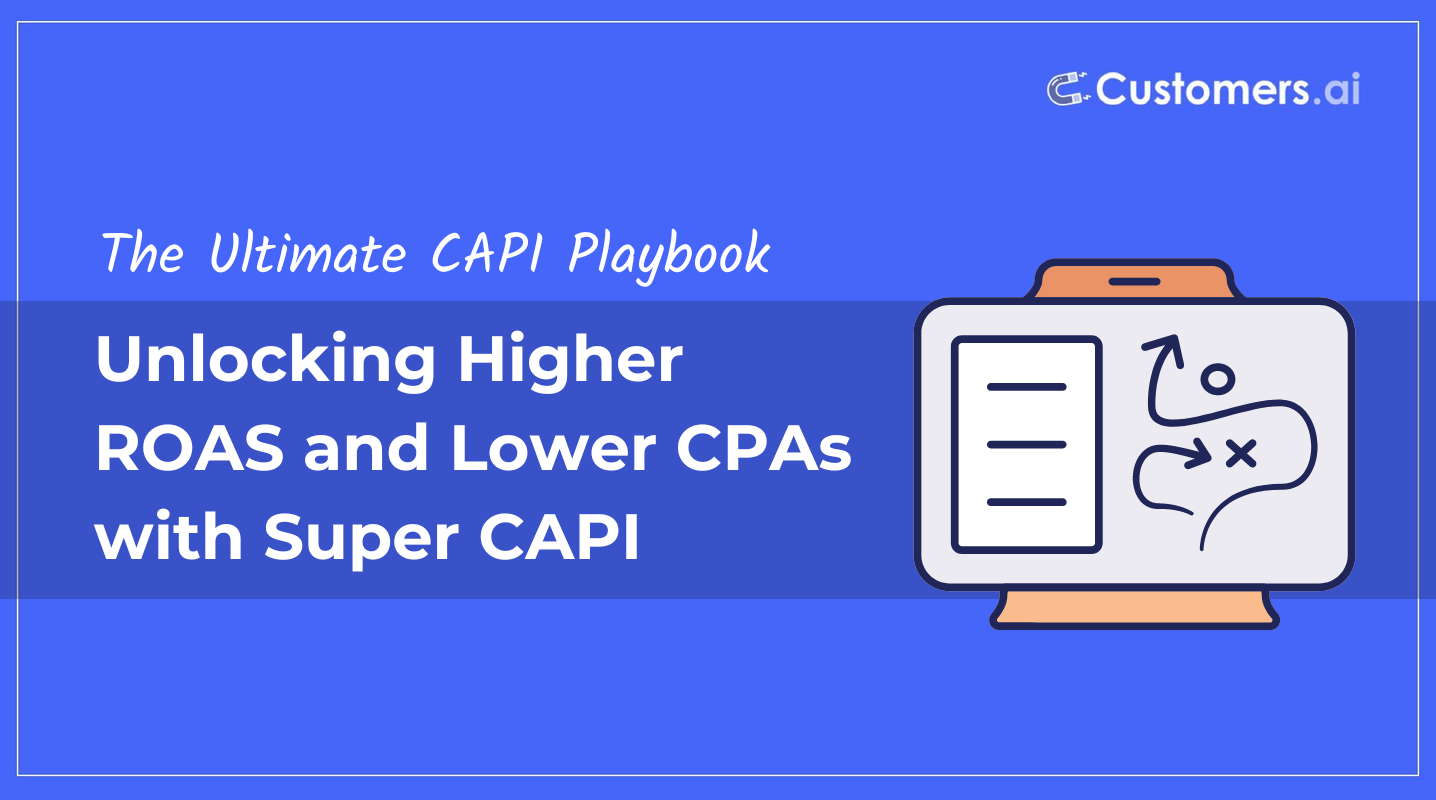Last month, Wordstream came out with its annual Facebook Ads Benchmarks Report. What was notable about the report, besides the shocking news that CPC and CPL were both down year-over-year, was the report’s recommendations to use CAPI to improve performance:
“Since your Facebook ads conversion rate is dependent on the actions you choose to track, having a clean way to catch all potential conversions coming from your ads is crucial.”
Of course it is! It’s why we rolled out Super CAPI and why our customers are seeing better Meta Ads performance than their competitors.
But understanding CAPI is easier said than done. In fact, many advertisers aren’t even aware of what it does or its impact on performance.
We want to change that.
So today, we are going to dive into the basics of CAPI, how it impacts your ad performance, and how to set up Super CAPI for lower CPAs and higher ROAS.
Let’s jump in.
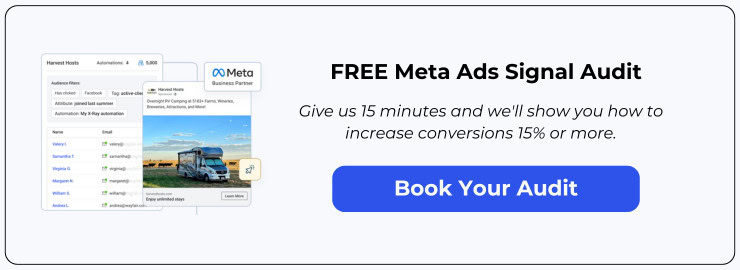
What is Facebook CAPI and How is it Used?
In simple terms, Facebook’s Conversions API (CAPI) is a tool that allows you to send conversion data directly from your server to Facebook, bypassing the limitations of browser-based tracking.
By using CAPI, you ensure that key actions like leads, purchases, and other valuable events are tracked more accurately.
Why does this matter?
As we’ve talked about in the past, privacy updates and ad blockers have put a real damper on Facebook’s ability to reach relevant audiences.
It’s why we’ve seen so many headlines like this over the past few years:

When it comes to Meta, better data means better ad performance – and that’s where CAPI comes in.
With CAPI, you’re not relying on cookies alone. You are giving Facebook more precise data to work with.
BUT – if you don’t give Meta that data – you are going to pay the price in the form of a “tax”.
Check this out.
Along with CAPI, Meta has something they call their Event Match Quality (EMQ) score. If you’re familiar with Google Ads, the idea of a quality score shouldn’t be new.
The premise is simple – if you have a high EMQ, you get “discounted” rates. Low EMQ…you pay the tax.

CAPI is key to your Event Match Quality.
The more events you send, the better your EMQ, and the better your ‘rates’.
Which leads us to Super CAPI.
What is Meta Super CAPI and How Does it Help Meta Ads Performance?
We like to think of Super CAPI as CAPI on steroids.
Instead of simply sending a few events, you can send thousands of events. In fact, one of our customers sent 250,000 events in their first month!
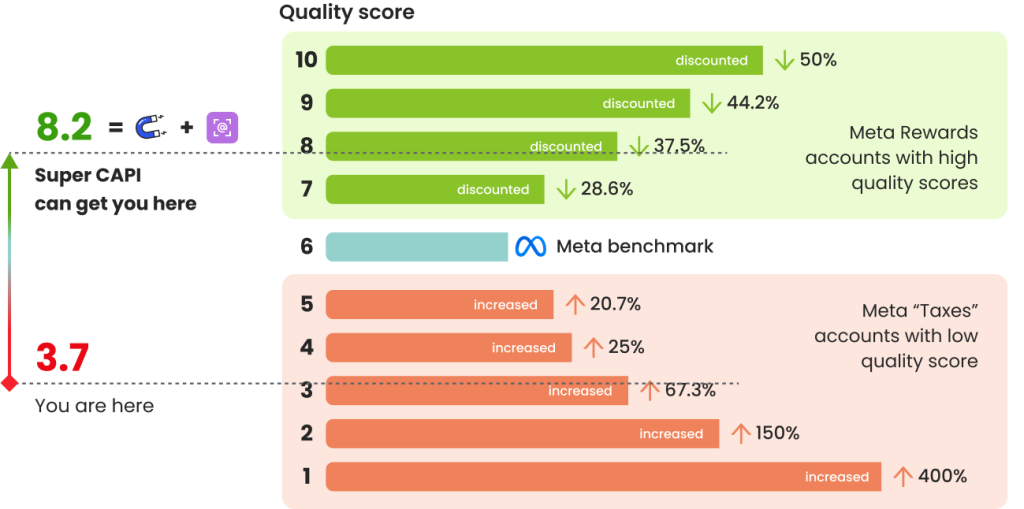
Because we can track anonymous visitors across the customer journey, and we integrate with your CRM and ESP, we have WAY more data than traditional API sources.
What does this mean for performance?
Improved EMQ and lower CPAs!
Check out what Huckle Bee Farms saw one month after implementing Super CAPI!

See the full case study for more details on how Huckle Bee Farms was able to achieve this.
Super CAPI is your avenue to better Meta Ads performance and the integration is simple.
How to Set Up Meta Super CAPI
Setting up Super CAPI is easy and requires no development work on your side. Let’s walk through how to set it up in your account:
1. Navigate to Facebook Under the Integrations Tab
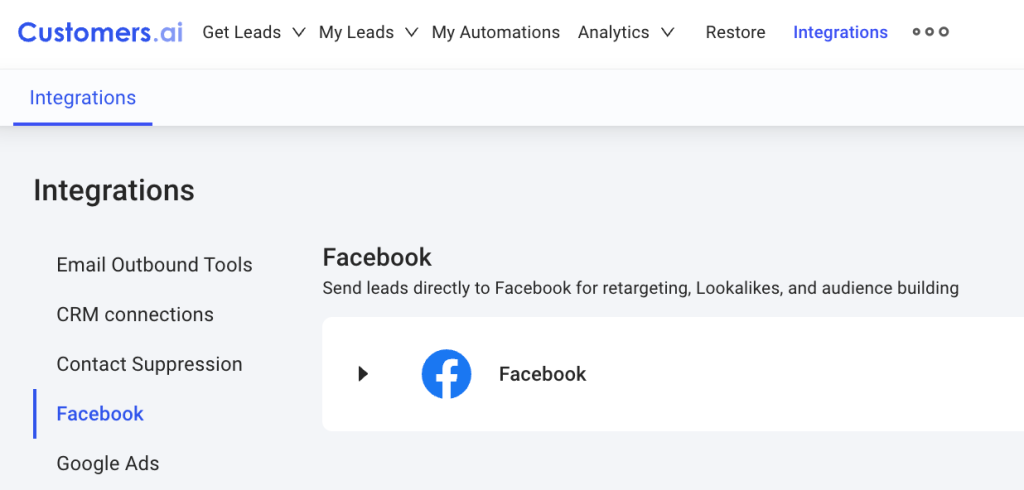
2. Choose Manage Your Events

3. Add in Your Key Events
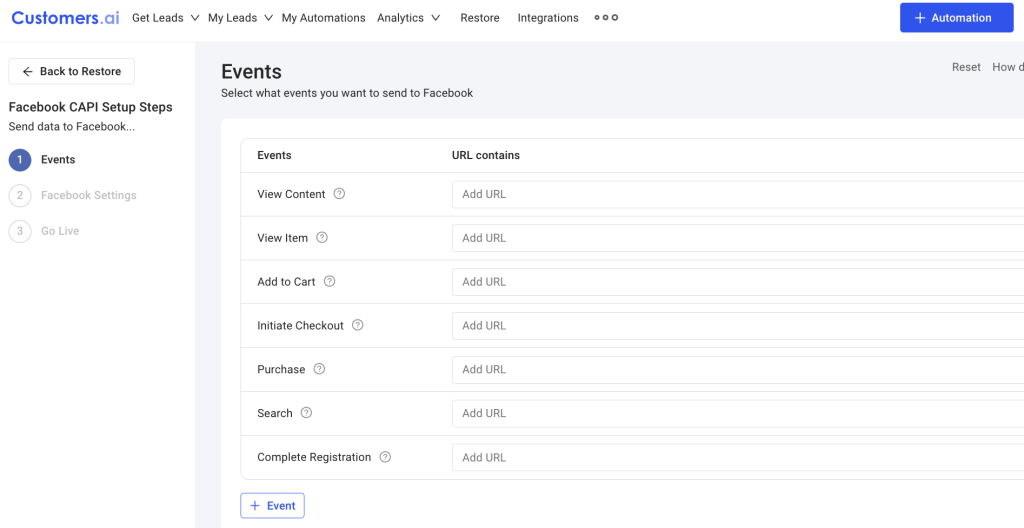
4. Track Your Events Sent

5. Watch Your EMQ Scores Skyrocket

Easy right?
See How Your Meta Ads Signals are Performing
Adding Super CAPI to your Meta Ads account is a no brainer at this point but if you still aren’t sold, we are offering all new customers a free Meta Ads Signal Audit.
Our experts have homed in on 5+ critical optimizations that aren’t on the radar of 99% of Meta advertisers we’ve spoken to in the last 60 days.
We’ll take a look at your account and tell you where you might be missing out. All at no cost to you.
Interested? Book your free audit here and lets get you on your way to lower CPAs and higher ROAS.

Important Next Steps
- See what targeted outbound marketing is all about. Capture and engage your first 500 website visitor leads with Customers.ai X-Ray website visitor identification for free.
- Talk and learn about sales outreach automation with other growth enthusiasts. Join Customers.ai Island, our Facebook group of 40K marketers and entrepreneurs who are ready to support you.
- Advance your marketing performance with Sales Outreach School, a free tutorial and training area for sales pros and marketers.
Facebook CAPI FAQs
What is the Facebook Conversions API (CAPI)?
The Facebook Conversions API (CAPI) is a tool that allows advertisers to send customer actions, such as purchases and sign-ups, directly from their server to Facebook’s servers, bypassing browser limitations. CAPI improves data accuracy, especially in light of privacy changes and ad tracking restrictions.
How does CAPI differ from the Facebook Pixel?
While the Facebook Pixel tracks events through a user’s browser, CAPI tracks events directly from the server, ensuring data is sent even when cookies or ad blockers prevent browser-based tracking. Together, Pixel and CAPI provide more comprehensive tracking coverage.
What are the key benefits of using CAPI?
CAPI provides several benefits:
- Improved Data Accuracy: Tracks conversions that may be missed by Pixel alone.
- Better Ad Targeting: Provides more complete data for optimizing ad campaigns.
- Increased Privacy Compliance: Aligns with privacy regulations by reducing reliance on cookies.
- Enhanced Reporting: Delivers clearer insights into customer behavior.
How does CAPI help with data privacy compliance?
By directly integrating with a business’s server, CAPI offers greater control over data sharing, ensuring that only the data intended for Facebook is transmitted. This helps businesses stay compliant with privacy laws, such as GDPR and CCPA, while still tracking conversions.
Why is CAPI important in a post-iOS 14.5 world?
With iOS 14.5 and other privacy-focused updates, traditional browser-based tracking methods like the Facebook Pixel have become less reliable. CAPI bypasses these restrictions by sending data directly to Facebook’s servers, preserving tracking capabilities and ad performance insights.
What types of events can be tracked using CAPI?
CAPI can track a range of customer actions, including:
- Purchases: Track completed sales for better ROAS measurement.
- Leads: Monitor form submissions and sign-ups.
- Add to Cart: Track when users add items to their cart but don’t complete checkout.
- Page Views: Monitor visits to key pages, such as landing or product pages. These events help advertisers analyze the full customer journey.
How does CAPI enhance retargeting efforts?
CAPI improves retargeting by ensuring more data is captured and tracked accurately. This allows advertisers to reach users who have previously engaged with their site, even if they’re using ad blockers or privacy settings that hinder Pixel tracking.
What tools are available to set up CAPI on a website?
Tools that facilitate CAPI setup include:
- Facebook Events Manager: Offers step-by-step instructions for integration.
- Shopify and WooCommerce Plugins: Simplify setup for e-commerce sites.
- Google Tag Manager (GTM): Integrates CAPI with other tracking scripts.
- Partner Solutions: Some third-party platforms offer built-in CAPI support.
Can CAPI be used alongside the Facebook Pixel?
Yes, using CAPI alongside the Pixel provides a dual-layer tracking strategy, capturing data missed by one method through the other. This comprehensive tracking approach improves data accuracy and enhances overall campaign insights.
How does CAPI improve ROAS (Return on Ad Spend)?
By ensuring data accuracy and capturing events that may otherwise be missed, CAPI enables more effective ad targeting and better conversion tracking, ultimately leading to higher ROAS. For example, an accurate purchase event count allows for more precise campaign optimization.
How does CAPI work with dynamic ads?
CAPI tracks events like product views, add-to-cart actions, and purchases, which are critical for dynamic ads. This data helps personalize ads for users based on their past behavior, showing them relevant products and increasing the likelihood of conversion.
What are best practices for setting up CAPI?
Key best practices include:
- Enable Both Pixel and CAPI: For maximum data coverage.
- Regularly Monitor Data Quality: Ensure event data is accurate and up-to-date.
- Use Aggregated Event Measurement (AEM): Comply with iOS privacy settings.
- Prioritize High-Value Events: Focus on key actions like purchases and leads.
Can CAPI help track offline conversions?
Yes, CAPI allows businesses to upload offline conversion data, such as in-store purchases, phone orders, and other offline actions. This helps create a complete view of the customer journey, combining online and offline interactions for improved ad performance insights.
How can small businesses benefit from using CAPI?
Small businesses benefit from CAPI by retaining accurate tracking despite privacy restrictions, enabling them to compete with larger businesses. With accurate conversion data, small businesses can better allocate their ad budget to optimize returns.
What types of industries can benefit most from CAPI?
CAPI is valuable across various industries, including:
- E-commerce: Track detailed online purchase behavior.
- Healthcare: Track appointment bookings (within privacy guidelines).
- Automotive: Track dealership visits and in-store conversions.
- Financial Services: Monitor lead form submissions for financial products.
How does Aggregated Event Measurement (AEM) support CAPI?
AEM helps advertisers comply with iOS 14.5’s data limitations by prioritizing specific events (like purchases or leads) for tracking. AEM ensures these prioritized events are reported accurately through CAPI, even when other tracking methods are restricted.
What challenges do businesses face when implementing CAPI?
Challenges include technical setup, ensuring accurate data matching, maintaining data quality, and managing privacy compliance. Using a partner solution or hiring an experienced developer can help simplify setup and minimize these challenges.
How can CAPI improve customer journey mapping?
CAPI provides accurate data on each stage of the customer journey, from awareness to conversion. This detailed data enables marketers to map out typical user paths, identify common drop-off points, and optimize the sales funnel accordingly.
Can CAPI be used for lookalike audience targeting?
Yes, CAPI data enhances the creation of lookalike audiences by providing more complete customer data. Facebook can analyze this data to create lookalikes that are more closely aligned with high-value customers, improving the effectiveness of audience targeting.
How does CAPI handle data matching?
CAPI uses data like email addresses, phone numbers, and device information to match website visitors with Facebook user profiles. This process is done securely, with data hashing, to ensure that user privacy is protected during data transmission.
What metrics should businesses monitor with CAPI?
Important metrics include:
- Conversion Rate: The rate at which tracked events lead to sales.
- ROAS: The return on ad spend generated through CAPI-supported campaigns.
- Event Match Quality: Ensures the data matches correctly with Facebook profiles.
- Attribution: Tracks which ads led to conversions.
Can CAPI help improve ad relevance?
Yes, by providing more complete and accurate data on customer behavior, CAPI allows for better ad targeting. Advertisers can create more relevant ad experiences based on actions like previous purchases or browsing history, improving overall engagement.
What is an example of a successful CAPI strategy?
A retail brand might use CAPI to track online and in-store purchases, uploading these events directly to Facebook. They can then create campaigns targeting customers who viewed specific items but didn’t purchase, offering limited-time discounts to drive conversions.
How can businesses test CAPI performance?
Businesses can test CAPI performance by comparing conversions and event data accuracy with and without CAPI. Using Facebook Events Manager, they can verify that events are tracking correctly and adjust based on performance insights to optimize results.
What are some popular CAPI implementation partners?
Popular partners include:
- Shopify: Provides direct integration with CAPI for e-commerce stores.
- WooCommerce: Offers plugins for CAPI setup.
- Zapier: Connects CAPI with multiple data sources.
- Google Tag Manager (GTM): Helps configure CAPI events for advanced tracking. Partner solutions simplify CAPI setup and ensure consistent tracking across platforms.
